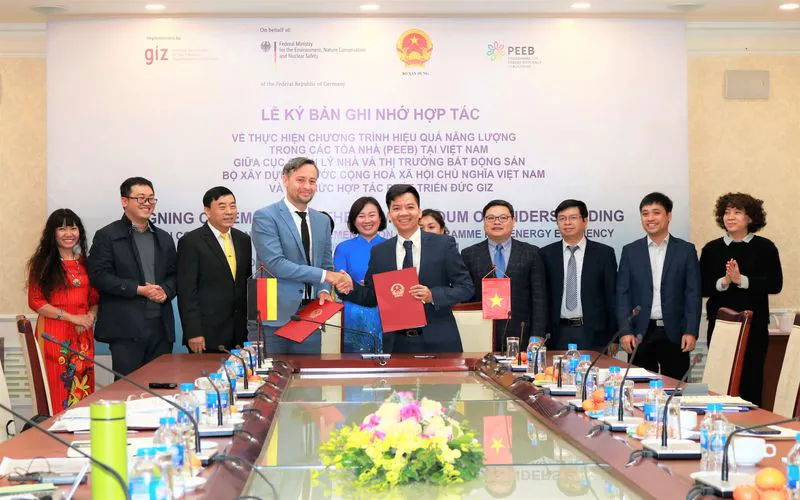GIZ helps reduce GHG emissions in Vietnam’s residential buildings
A particular focus of the partnership is on improving energy efficiency and reducing GHG emissions in the affordable housing segment.
A Memorandum of Understanding (MoU) was signed on January 6 to focus on enabling greenhouse gas (GHG) emissions mitigation in Vietnam’s residential building sector.
The MoU was signed between Mr. Ha Quang Hung, deputy director general of the Ministry of Construction’s Housing and Real Estate Market Management Bureau (HREM) and Mr. Kia Fariborz, chief technical advisor of the “Support Program for the Implementation of the Paris Agreement (SIPA)” under German Development Cooperation - GIZ Vietnam.
The signing ceremony was conducted in the frame work for cooperation on the joint development of the Vietnam Green Housing Program (VGHP) under the implementation of the Programme for Energy Efficiency in Buildings (PEEB).
The PEEB aims to minimize energy demand in buildings at reasonable incremental costs, promote green investment in energy efficient buildings, and facilitate access to green financing from international and local financial institutions. In Vietnam, the PEEB focuses on green housing programs and large-scale commercial buildings.
At the signing ceremony. |
The VGHP, supported through the PEEB in Vietnam, aims to benefit the mid-income housing market through targeting the low-cost commercial housing segment.
Under the partnership, GIZ and HREM will cooperate to develop and implement the Vietnam Green Housing Program.
A particular focus of the program is on improving energy efficiency and reducing GHG emissions in the affordable housing segment as per Vietnam’s commitment in its Nationally Determined Contribution to the Paris Agreement on Climate Change.
Through cooperation on the Vietnam Green Housing Programme, the partnership aims to motivate private housing developers to move into the market for energy-efficient and green buildings.
Besides, the cooperation will help stimulate local commercial banks to develop green financing products for both housing developers and homebuyers, as well as green equipment and material suppliers in the low-cost commercial housing segment.
In Vietnam, the total production value of the construction sector has contributed 5.94% of the national GDP in 2019.
As an emerging economy, Vietnam is expected to see a dramatic increase in demand for spacious and comfortable residential property due to the rapid growth of the middle class with approximately 50 million square meters of housing added in 2019.
“As the potential for GHG emissions reduction through energy efficiency in the construction sector is enormous, this cooperative endeavour will contribute to Vietnam’s aim of reducing GHG emissions”, said Kia Fariborz.
Regarding this issue, Mr. Ha Quang Hung appreciated the initiative for integrating the PEEB’s goal of energy efficiency and low emissions with the Vietnamese government’s goal of low-cost commercial housing development.
As estimated, within 10 years after reaching the target of the Green Housing Program, the apartment buildings will save about 6.3 billion kWh of electricity. This is a significant saving that will benefit the homebuyers if they use energy efficiently in the apartment.











